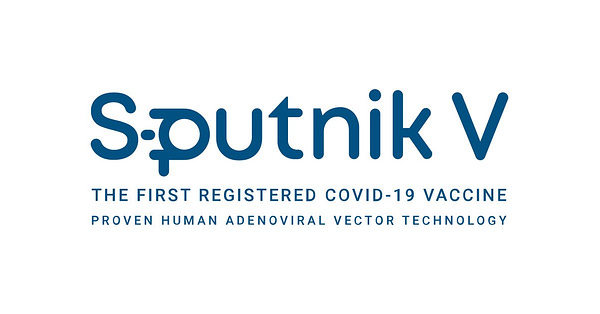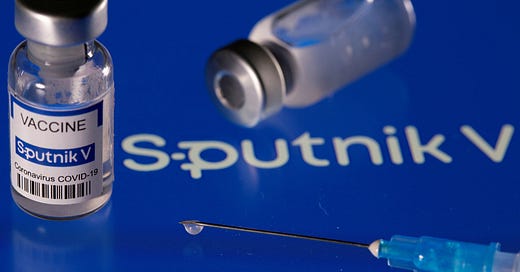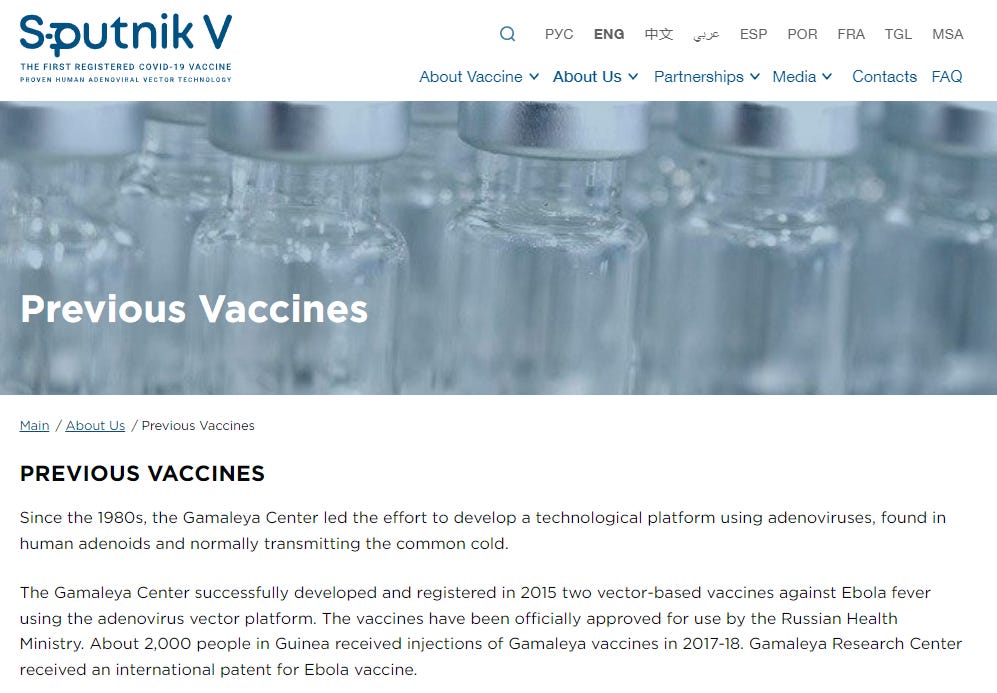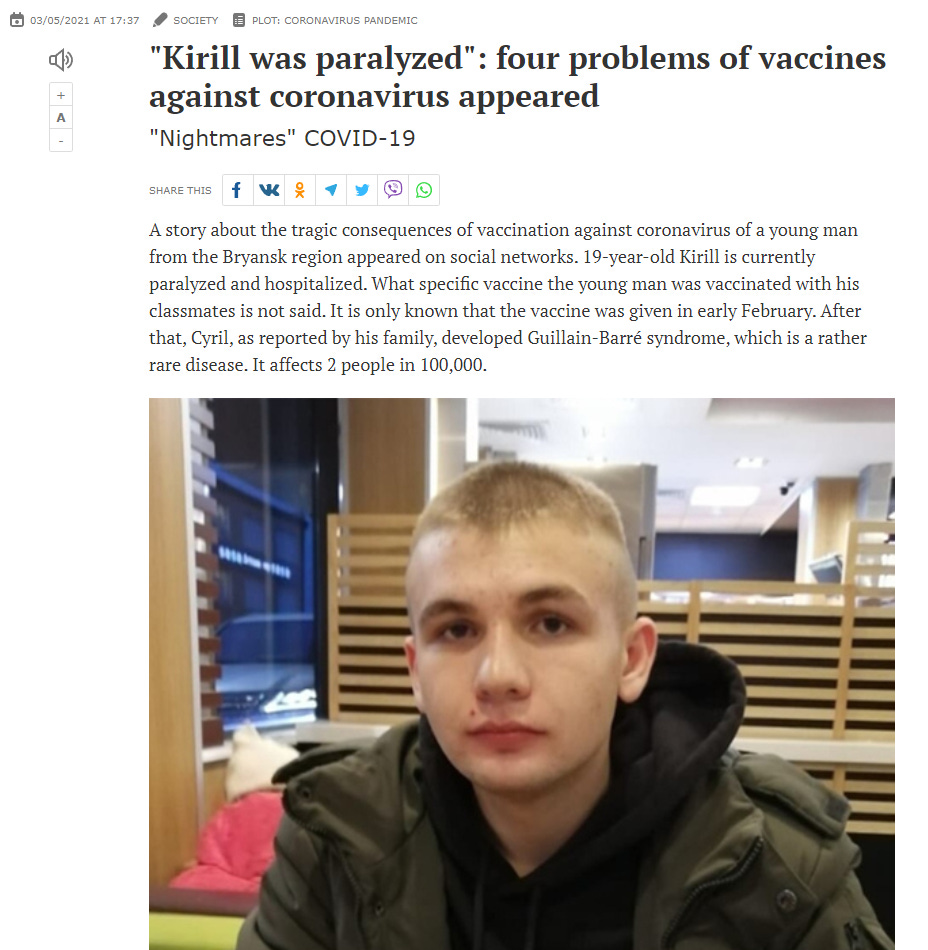Sputnik V is sketchy
Russia launched the world's first COVID vaccine using lazy, easily refuted talking points. It's time for Sputnik V and its boorish cheerleaders to return to Earth.
NOTE: This is the first installment of what we hope will be a multi-part series exploring Sputnik V. Consider this a “teaser.” We are working on an introduction to this series that will be published separately.
“It usually takes about five years to develop and introduce a vaccine into clinical practice. Russian scientists have completed it in 2.5 months. They themselves created a vaccine and tested it on themselves,” Russia’s Channel One announced on May 19, 2020.
The television network was referring to what would soon become the world’s first registered COVID-19 vaccine—Sputnik V—developed by the Gamaleya Center, a division of Russia’s Ministry of Health. Using its human adenovirus delivery platform as a template, the Gamaleya Center purportedly produced a near-flawless drug at breakneck speed.
“The vaccine created using this technology protected both humans and experimental animals with 100% effectiveness. Recently, a year and a half ago, we created a vaccine against the MERS virus, this is the Middle East respiratory syndrome, the closest relative of COVID-19,” Gamaleya director Alexander Gintsburg explained to Channel One.
Over the following months, this talking point was repeated and recycled until it was accepted by many—without question—as fact.
The myth of Gamaleya’s time-tested vector tech was also aggressively pushed in the West. In September 2020, Kirill Dmitriev, the CEO of the Russian Direct Investment Fund—which financed Sputnik V—wrote an op-ed for RT.com highlighting how Gamaleya Center had successfully retooled tried-and-true technology developed years ago.
“Russia has benefitted from modifying for COVID-19 an existing two-vector vaccine platform developed in 2015 for Ebola fever, which went through all phases of clinical trials and was used to help defeat the Ebola epidemic in Africa in 2017,” wrote Dmitriev, a Harvard and Stanford-educated investment banker who previously worked for McKinsey and Goldman Sachs.
Dmitriev ended his op-ed by dropping a Tsar Bomba on Big Pharma, insisting that Sputnik V was built on a “proven” platform, unlike competing vaccines which use “unproven novel approaches.”
There’s just one small problem—let’s call it a minor footnote. Dmitriev (and RT) forgot to mention that Sputnik V represents Gamaleya’s fifth attempt at creating a vaccine—its four previous attempts either failed or are still in trials. What exactly has Gamaleya “proven”?
As Alexander Redko, the head of St. Petersburg’s Professional Association of Medical Workers, noted earlier this year:
From 2009 to 2021, [Gamaleya] did not make a single approved vaccine… this is the fifth vaccine Gintsburg has developed. The fifth. But none of them have received approval.
It’s a long and fascinating tale. We strongly recommend an August 2020 report published by fontanka.ru, which provides many humorous details about Gamaleya’s “proven” methods. (The article is in Russian but Google’s machine translation is surprisingly readable):
Unsurprisingly, the Russian government has been less than forthcoming on this matter.
On Sputnik V’s website, there’s a page about Gamaleya’s “previous vaccines”—which, really, should just be a blank page. Instead, the page uses vague wording and lies-by-omission to carefully tip-toe around the fact that Gintsburg has yet to create a single “vector” vaccine deemed safe and effective for the international market:
The Gamaleya Center successfully developed and registered in 2015 two vector-based vaccines against Ebola fever using the adenovirus vector platform. The vaccines have been officially approved for use by the Russian Health Ministry. About 2,000 people in Guinea received injections of Gamaleya vaccines in 2017-18.
One might infer from this statement that 2,000 residents of Guinea were immunized with Gamaleya’s “successfully developed” drugs. But if you click over to Sputnik V’s “About Us” page, you’ll find this:
About 2,000 people in Guinea received injections of Ebola vaccine in 2017-18 as part of Phase 3 clinical trial.
It’s bizarre that Gamaleya is bragging about jabbing 2,000 people in a clinical trial and trying to pass this off as some sort of accomplishment or proof that its drugs are safe and effective. Frankly, it’s embarrassing.
According to a World Health Organization document (dated October 2018), Gamaleya’s Ebola vaccines only have emergency use authorization in Russia. And for whatever reason, Gamaleya has decided against applying for the WHO’s emergency use assessment and listing procedure (EUAL) for candidate medicines:
Gamaleya’s Ebola vaccines played no meaningful role in “defeat[ing] the Ebola epidemic in Africa in 2017,” as Dmitriev falsely claimed in his RT op-ed. How could they? They’ve yet to be approved for use outside Russia.
It’s similarly puzzling that Gintsburg and others have pointed to Gamaleya’s MERS vaccines as proof of Sputnik’s safety and efficacy. As of December 2020, Gamaleya’s MERS vaccines are still undergoing trials, and have not been approved anywhere in the world—including Russia.
Sputnik V’s own website links to pages showing that Gamaleya’s MERS vaccines are still being tested. Is this what qualifies as “previous vaccines”? Apparently, yes.
So what’s the takeaway?
The narrative that launched Sputnik V into orbit (“they were able to make it so quickly because they used their proven, ready-to-go and completely safe formula!”) is demonstrably false.
The fact that Sputnik V’s website completely misrepresents (one might say “lies about”) Gamaleya’s track record is another massive red flag.
Okay… but at least Sputnik V isn’t as dangerous as the West’s clotshots, right?
So transparent, so safe
People on the internet love to talk about how safe Sputnik V is. How could they possibly know?
There is no VAERS-like database that Russians can browse, and the media has been largely silent on the subject of adverse reactions. Since they are rarely reported, it seems the government’s position is that they do not exist.
People are basically completely reliant on social media and word of mouth to piece together what the heck is going on with these vaccines—which is not a good thing.
(Some unruly citizens tried to maintain an unofficial tally of suspected vaccine-related fatalities—but this grassroots campaign stopped posting updates in mid-September.)
Still, there have been some interesting reports that have slipped through the cracks.
A document leaked to Russian media in August 2020 showed that adverse events from the vaccine were “occurring frequently and very often.” While some of the side effects were mild and passed quickly, others apparently lingered on indefinitely:
In 38 subjects, 144 adverse events were recorded. Most passed without consequences. However, on the 42nd day of the study, 31 adverse events had not been resolved (laboratory abnormalities of immunological parameters were registered). The outcome of 27 [adverse effects] is still unknown to the developer, it follows from the documents.
After vaccination, the volunteers reported swelling, pain, hyperthermia and itching at the injection site. Common manifestations are asthenia, malaise, pyrexia, fever, decreased appetite, headache, diarrhea, pain in the oropharynx, nasal congestion, sore throat, runny rose.
Concerns about (officially non-existent) serious adverse effects are also fueling push-back against mandatory vaccination in Russia. For example, a group of bus drivers in Chelyabinsk recently made headlines after announcing that they would resist compulsory inoculation for transportation workers. One of the drivers explained:
I and many of my colleagues are not going to get vaccinated, because after it many people feel bad. Imagine yourself, I'm driving and suddenly I felt very bad, and behind my back are the passengers for whom I am responsible. My wife is a teacher, she said that one of her colleagues had been vaccinated, and now she faints in class. The same can happen to the driver or conductor. Therefore, many of us, as they can, refuse, write statements [of refusal].
Only long-term data and observation can show whether Sputnik V is actually safe. Unfortunately, research that could have helped answer vitally important questions about long-term safety has been rendered largely useless.
Gintsburg revealed in December 2020 that many of those who received a placebo during the clinical trials for Sputnik V later got the actual vaccine, thinning out the control group. Not to worry though, the vaccine has already been proven safe and effective:
The reasons for stopping the recruitment of volunteers for the placebo group, the head of the Gamaleya center, Alexander Gunzburg, explained that "everything is proven there," and "the pandemic is underway, and the placebo is not good at all."
This is Science. (Notably, Moderna and Pfizer also sabotaged their control groups. “Long-Term Studies Of COVID-19 Vaccines Hurt By Placebo Recipients Getting Immunized,” NPR reported in February.)
There’s much more to be said on the subject of Sputnik V’s clinical trials and the expedited process used to bring Russia’s vaccine to market. Even state media seemed a bit uneasy when the Russian government approved Sputnik V in August 2020. At the time, the drug had been administered to less than 100 trial subjects.
So effective
On November 9, 2020, Pfizer revealed that interim trial data had shown its COVID vaccine to be more than 90% effective. Two days later, Gamaleya issued a statement (tweeted in CAPS LOCK) declaring Sputnik V was 92% effective.


Moderna followed with its own announcement on November 16, describing its drug as around 95% effective.
A week later, Gamaleya reported that a “second interim analysis” of its data showed that actually, Sputnik V is also 95% effective:
“It's very difficult to explain [the Gamaleya] announcement,” Svetlana Zavidova, the head of Russia's Association of Clinical Trials Organizations noted at the time. “I'm afraid they looked at the results of Pfizer and added 2%.”
Very hurtful and rude to suggest such things.
Does Sputnik V have any neutralizing effect at all? More than 49 million Russians (out of a population of about 146 million) have been fully vaccinated. That’s not an insignificant number. And yet, COVID “cases” and “deaths” are surging. This is true even in regions with high vaccination rates.
Cases plummeted and deaths plateaued after compulsory vaccination was introduced in several regions in June. Then, quite suddenly, cases and deaths began to skyrocket following the Duma elections in late September. Regional and federal authorities then declared that it was necessary to implement vaccine passports and other coercive measures—unpopular policies that would have likely prompted angry Russians to flock to the polls had they been implemented before the parliamentary elections.
Can we trust these numbers? In October 2019, the Russian government admitted that the country’s mortality rates had been manipulated as part of a years-long hoax. Regional governments had been ordered to reduce the number of deaths from heart attacks and other ailments. They did this by reporting cardiovascular-related deaths as fatalities from “other causes.” Easy!
There is a total lack of transparency in Russia when it comes to COVID figures. Even detailed statistics about vaccination rates are difficult to come by. As we reported in September, there are very good reasons to doubt the official numbers—which are now being used to impose vaccine mandates and digital health IDs. “So it goes.”












